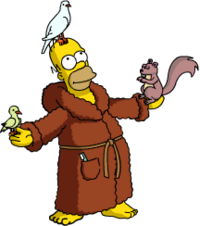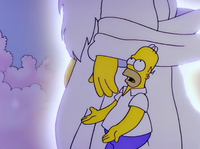- New article from the Springfield Shopper: Season 36 News: Another Preview Image for “The Man Who Flew Too Much” and details on other episodes have been released!
- New article from the Springfield Shopper: Season 36 News: Two new Preview Images for “The Man Who Flew Too Much” have been released!
- Wikisimpsons needs more Featured Article, Picture, Quote, Episode and Comprehensive article nominations!
- Wikisimpsons has a Discord server! Click here for your invite! Join to talk about the wiki, Simpsons and Tapped Out news, or just to talk to other users.
- Make an account! It's easy, free, and your work on the wiki can be attributed to you.
  
Homer the Heretic/References
Wikisimpsons - The Simpsons Wiki
Debut appearances
Cultural references
Trivia
- The date of the Playdude is July 1986.
- God has five fingers instead of four.
- It is revealed that Apu is Hindu, and Moe is a Snakehandler.
- Some fans of The Simpsons have held parties on June 5 and calling it "The Feast of Maximum Occupancy", in reference of Homer's excuse to get out of work by making up a holiday by looking at the safety warning at Moe's Tavern, which reads "Maximum Occupancy, 65". The June 5th party date is a reference to the digits 6 and 5.
- At the end of the episode, God tells Homer the meaning of life, but the closing credits start before the audience can hear it.
- God also mentions that Homer has to wait 6 months to know the meaning of life, because Homer will die. Homer later dies for a few seconds in "Homer's Triple Bypass", which aired approximately six months after this episode. Ironically, that episode also has Homer dreaming about what is implied to be Hell and referring to it as a "wonderful dream."
- The chalkboard gag, "I will not defame New Orleans", is a reference to complaints the show received about the song about New Orleans in the previous episode, "A Streetcar Named Marge".
- This episode shows how Homer was born. Unlike Bart's birth in "I Married Marge", Lisa's birth in "Lisa's First Word", and Maggie's birth in "And Maggie Makes Three", Homer was seen being born from inside the womb and not from outside the womb. You can clearly tell this by the womb's shape at the beginning of the scene, the amniotic sac breaking after Homer's dance, the umbilical cord that's attached to Homer before he pulled it out from the womb, and a hand (possibly the surgeon's) pulling Homer's legs out of the womb while he grasps onto it as he gets delivered. However, just before the rest of Homer gets delivered after his legs, the scene cuts to the present, where Homer, grabbing onto his bed's headboard (similar to how he grasped the womb when he was delivered), is getting pulled out of bed by Marge. This reveals that Homer was dreaming about his birth, and Marge was pulling on Homer while telling him to wake up, similar to how the surgeon's hand pulled Homer out of the womb at the end of Homer's dream about his birth.
- This episode also reveals that Homer was a breech baby and he was born via a breech delivery during Homer's dream about his birth. You can clearly tell this by the surgeon's hand delivering Homer's legs first.
Continuity
Goofs
- God is shown as having five fingers instead of the four which are the norm in the cartoon world. But at the end of the episode when God is telling Homer the meaning of life, he has four fingers and toes instead of five.
- When Lisa is telling Homer that "this [the fire] is an act of God", Lisa's ear keeps disappearing and reappearing when she moves.
- When Homer is opening up the waffle iron, the machine's legs disappear for a frame.
- When Homer is sleeping, the fire burns off his hair on his head. But when he wakes up and jumps up off the couch, his hair is back again.
- Ned, despite being an overbearing Christian, discovers the Simpsons' house is burning while everyone else is at church. However, most churches have more than one mass so Ned could have went earlier or later.
- When Marge says, "Kids, your father doesn't really mean that," Bart is in front of Homer, but immediately afterward, Bart is suddenly behind Homer. Then, when Marge asks, "Homer, are you actually giving up your faith?" Bart is in front of Homer again.
|



